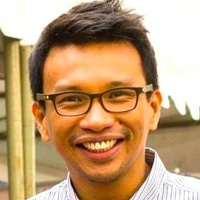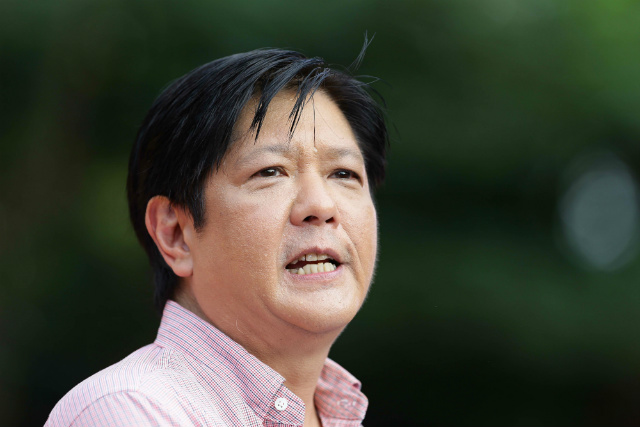
He has said it before and continues to say it anyway. He will apologize only for the mistakes he committed. That's a clever way of telling us no, he won't, thank you.
The moral injunction behind it is that an innocent child cannot be blamed for the sins of the father. That is correct.
Except that Bongbong Marcos cannot claim innocence.
What Ferdinand Junior can claim is the uncanny ability of deflecting issues hurled at him. His sleight of hand? Deny the accusation, blame someone else, and invoke selective moments of glory under his father's presidency. Cue cheers from his loyalists.
Nothing can be more surreal – and simplistic – than his narrative. He has mastered the art of creating for himself and his followers an irrefutable fantasy. In his comic book, Mr Marcos wears a cape like a superhero as if to save the Filipino people.
Whether he believes his account or not is not a fundamental issue. The bigger concern is that his narrative of denial has gained traction. It exploits the already weak collective memory of Filipinos and has hijacked the unread past.
And to give it the sense of hope many long for, Mr Marcos wants to carry on the unfinished project of his father. He promises to "lead a revolution in heart, mind, and action."
For him, the past is long gone and the future is for us to seize. As in any religion, nothing can be more compelling than this eschatology of hope. Why then should Mr Marcos, the savior, apologize?
Too many questions

In spite of his assertions, the son cannot claim innocence. The facts are incontrovertible. He was, to begin with, already a teenager when his father declared Martial Law and in his late 20s by the time People Power took place.
Unless he was, of course, elsewhere. And he was. Although he finished his elementary education in Manila, he left in the 1970s to continue studying in England. He then moved to the US to study some more. He went to Wharton (yes, that same school Mayor Duterte is fond of) but no record shows he ever finished his MBA there.
But he was not away because he was a geek and loved "philosopy, politics, and economics." No, he did not finish that degree at Oxford either. Like the children of other dictators, Ferdinand Junior was conveniently sent abroad. Understandably, the good senator from Ilocos was proud of his academic credentials.
Until he was exposed. So now, he does not like talking about his education (or the lack of it).
And there are many other things he does not like to talk about.
He has denied responsibility for his family's hidden wealth even if he was oficially identified as a beneficiary. He has, of course, downplayed the cruelty of the Martial Law, preferring instead to talk about the infrastructural accomplishments of the time. Some people still think that he was too young when it all happened but, of course, he was not. He became vice governor and governor of Ilocos Norte in the 1980s, during which at least two extra-judicial killings took place in his province. In 1985, Ferdinand Junior, at 27, was the chairman of the board of Philippine Communications Satellite Corporation. Later on, investigators found out that Philcomsat was a conduit of the family's ill-gotten wealth.
All these facts and more are simply dismissed by Bongbong Marcos as "politics."
Time to move on
Marcos has now topped recent surveys. He is poised to clinch the vice presidency. Before we know it, he may already be the next president of the Philippines.
For many, that is a scary thought, even a nightmare according to a colleague. To allay people's fears, he has repeatedly said, too, that it is now time to move on. And in his closing statement at CNN's vice presidential debate, he presented himself as one who can unite people.
And yet there are many others rendered helpless by his unstoppable victory. By no less than the same people who witnessed his father's atrocities. And make no mistake here. The youth, often accused of ignorance, are not in fact behind him.
Simply put, Bongbong Marcos may win but won't have popular mandate. This is a reality that neither Mr Marcos nor his loyalists can simply dismiss. How then can he unite a people so divided?
He wants us to move on. We also want to move on. But he first needs to take a step back.
And for him to do so, he has no choice but to dispel the very myth he has come to believe. It will be difficult though because everything about him is myth.
If he truly wants to be a unifying leader, he must admit that his family is responsible for the mess we are in. Otherwise, he, like his mother, will forever live in a fantasy that only he could have created for himself and his loyalists.
And the rest of us will never move on. – Rappler.com
Jayeel Serrano Cornelio, PhD, is the director of the Development Studies Program, Ateneo de Manila University and a member of the board of the Philippine Sociological Society. He is an investigator on Vote of the Poor 2016, an ongoing study funded by the Institute of Philippine Culture. Follow him on Twittter @jayeel_cornelio.